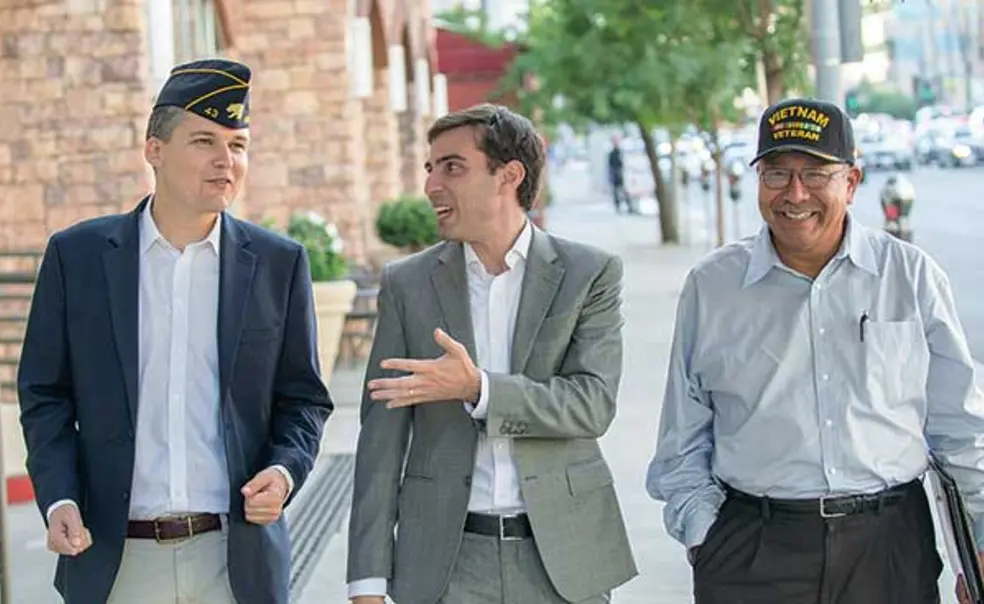Jesse Creed ’07: Soldiers’ Home
A restored campus for veterans could provide housing, aid to thousands of homeless vets in L.A.
Nestled just west of Los Angeles’ I-405 freeway, between the neighborhoods of Brentwood and Westwood, sits a 388-acre patch of land that is slowly being transformed into a home for thousands of veterans living on the city’s streets.
The land was donated in 1888 as a haven for elderly and disabled veterans, and became the campus of the Department of Veterans Affairs West Los Angeles Medical Center. During the Korean War, there were 5,000 veterans living on the campus. But more recently, the VA rented out the space to various companies and organizations, while thousands of U.S. veterans slept on the city’s streets.
Now, thanks in part to the advocacy of Jesse Creed ’07, the land is being returned to its original purpose. Creed was an attorney for a group of homeless and disabled veterans who sued the VA in 2011, accusing the federal agency of violating the original deed by renting the land to various commercial and other endeavors — including a private transportation company, a hotel-laundry facility, and UCLA’s baseball stadium — while failing to provide any housing for veterans.
Creed took on the lawsuit pro bono as an attorney at a prominent Los Angeles law firm. From the beginning, the project struck a personal chord for Creed, who knows the burdens of housing instability firsthand. When he was 6, Creed’s parents declared bankruptcy and the family lost their home. For nearly a decade, he moved almost every year until his family settled in Los Angeles. “The stability of a permanent home is really what allowed me to flourish,” he says. “That physical home was so critical to my life — it made me feel more confident in taking risks and studying and working hard and eventually going to Princeton.”
Providing permanent housing, Creed says, is the crucial first step to helping homeless veterans, especially those who are living on the streets without any kind of shelter. “Before you can get your life on track and become economically and socially independent, you need a home — a place where you can sleep, shower, put on fresh clothes, regroup at the end of the day,” he says.
Of the approximately 58,000 homeless people in Los Angeles, about 10 percent are veterans, many of whom became homeless due to disabilities sustained during their military service, like PTSD and traumatic brain injury. “This level of homelessness is a national disgrace and embarrassment,” Creed says. “These are people who put their life and limb at risk for our liberty and safety.”
Then-VA Secretary Bob McDonald reached a settlement in 2015 with the veterans and their attorneys, including Creed, promising to redevelop the campus as a community for more than 1,000 homeless veterans and direct reform of the local leadership from Washington. A former VA employee and an executive at one of the companies involved in the illegal leases were eventually convicted of bribery and fraud following an investigation in the wake of the lawsuit.
Since 2016, Creed has been responsible for helping guide the revitalization of the campus through Vets Advocacy, a nonprofit organization created as part of the legal settlement. Vets Advocacy is responsible for working with the VA to transform the campus into at least 1,200 homes for veterans, complete with mental-health services, a new hospital space, and a “town center” for veterans to socialize and receive supportive services like job training.
Creed served as the executive director of the group during key negotiations over the selection of the principal developer, and although he stepped down last year to take a job with a law firm, he has continued his work in a pro bono capacity, assisting with oversight and community engagement. The project is being funded jointly by the federal government, the state of California, and the city and county of Los Angeles. It’s not yet clear what the total bill will be, but Creed estimates that the infrastructure costs alone will total $2 billion.
Providing permanent housing, Creed says, is the crucial first step to helping homeless veterans, especially those who are living on the streets without any kind of shelter. “Before you can get your life on track and become economically and socially independent, you need a home — a place where you can sleep, shower, put on fresh clothes, regroup at the end of the day,” he says. The mission, according to Creed, is to provide stable, permanent housing to veterans in need. There is no timetable for the veterans to move on — they can live on the campus indefinitely if they choose.
Last year, 54 units opened on the VA’s campus, with 150 more slated to open this year. It’s a small fraction of the space that will eventually be available; when the plan is complete, according to Creed, there will be enough homes for L.A.’s entire homeless veteran population. But it’s unlikely that every displaced veteran in the city will end up living on the campus. For one thing, outreach to a vulnerable, transient population can be difficult. And some may not want to move to West Los Angeles, which is far from where many homeless veterans currently live.
Despite these challenges, Creed sees the campus as a game-changer for the city’s veterans and a model for other places, even those without land specifically designated for housing veterans. Once the Los Angeles project is complete, he hopes to help other cities explore similar models. “We’re lucky to have the space that was donated for this purpose, but other cities with large homeless veteran populations should be evaluating what they can do to support these people who have done so much for our country,” he says. “When there’s enough energy, collaboration, and know-how, the public and private sector can and should work together to do the right thing.”












No responses yet